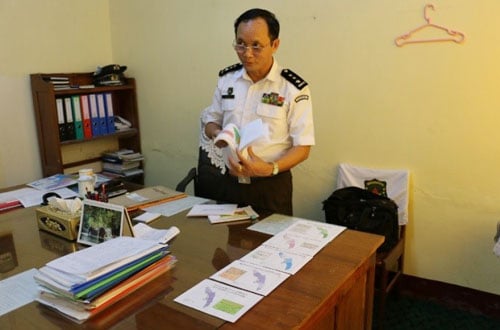“Look”, says U Win Lwin, pointing to a series of maps of Rakhine in Myanmar. “These are the areas where the hygiene conditions are poor, and these, look, are the areas where education levels are low. Can you see how they correspond?”
U Win Lwin is a man on a mission. He wants to use the data from the 2014 Myanmar Housing and Population Census to develop the state of Rakhine. And as the Director of Immigration for the entire state, he has the power to do so.
Mapping is one of many tools made available to help local officials interpret and put census data to use. And although U Win Lwin has access to data tables, narratives, graphs and maps, he prefers to use the maps when he meets with politicians and civil servants to explain what type of action is needed where and why.
“When I show them the maps, they are very interested. They can see where people don’t have electricity, where they don’t have toilets, where they don’t have access to clean water. They can see where people have a low level of education. And they can see how there is a correlation between these indicators.”
The census data is also essential for identifying emerging crisis hotspots. This week U Win Lwin is helping local authorities draw up an action plan to manage the impact of the water shortages expected from the 2016 El Niño, predicted to be one of the strongest in history.

U Win Lwin studied physics. It is clear that he is at ease with data and that he like number crunching. “Yes, I am interested in data”, he says,” but this is really not about numbers. What I am truly interested in is improving the lives of people in Rakhine.”
He has studied the tables and the maps back and forth, and his conclusion is that the underlying reason for Rakhine’s underdevelopment is lack of education. He has also pinpointed a huge gap in the Rakhine population pyramid for men aged 20-24. A gap which he then cross-checked against the migration data graphs. Hence, he knows that the majority of young men who leave Rakhine do so to find jobs, and he knows where they go to look for work.
“We must improve education. Also for displaced people. And we must create good jobs so that our young men do leave for Yangon and Thailand to find work. We must focus our efforts on education and employment. ”
U Win Lwin has in-depth knowledge about displacement. Before he was transferred to Rakhine in early 2016, he worked in Kachin which hosts 100,000 of Myanmar’s 645,000 internally displaced people. Still, in the Myanmar context, moving from Kachin to Rakhine is “out of the ashes, into the fire” for an immigration officer. In Kachin, people are displaced due to armed conflict between government and non-government forces. In Rakhine, the situation is more complicated. International concern is focused on the part of the population which self-identifies as Rohingya, 140,000 of which live camps since the outbreak of intercommunal violence 2012.
In the 2014 census, the government did not enumerate the over one million people who wished to self-identify as Rohingya. Though the Rakhine census results are incomplete, U Win Lwin works with the data that is available and which still gives good picture of the state’s challenges. He is one of many champions across Myanmar who use census data as a tool for development. He has showed and explained the census data to the previous state government, and he vows to continue his mission with the new government, showing the new politicians the maps and the graphs from the census results, and repeating his mantra to them: “Education and employment. Education and employment.”
UNFPA has provided, and continues to provide, technical assistance towards the 2014 Myanmar Housing and Population Census.


